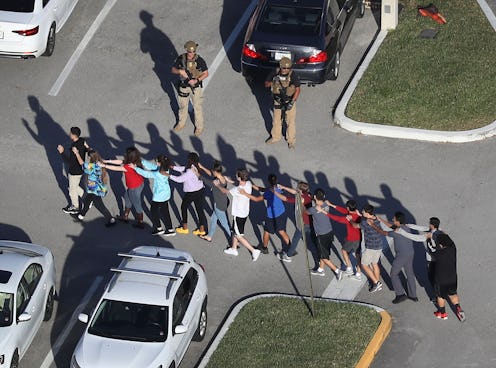News
Parkland Students Go Back To School Today — Here's What They're Saying

Two weeks to the day after a gunman opened fire and killed 17 people at Marjory Stoneman Douglas High School in Parkland, Florida, students returned back to school. Over 3,000 students, as well as faculty and administrators, went back to the site where the atrocity occurred — and many weren't sure what that would feel like.
"You don't really know what to expect the first day you get back after something like this," 16-year-old student Sawyer Garrity told CNN. "How do you react when something like this happens? There's no code of conduct, there's no rule book, no guidelines to follow, we're all just guessing in the dark here."
School administrators planned a "phased re-opening" to ease the transition back into school. The school day will be just four hours long this week, lasting from 7:40 a.m. to 11:40 a.m, and will begin with fourth period (the period that was interrupted by the shooting). Some students are taking additional time off and will return back when they're emotionally able. Teachers returned on Monday and have been preparing for the classes to resume.
For some, the return will be helpful. "We're all just talking about going back and seeing our teachers and hugging them, just hugging our classmates and just being together with everyone," student Hannah Karcinell told CNN.
"I'm happy to be going back in a sense because it's going to be a little bit of normal that we can have again," said 16-year-old Ashley Paseltiner.
But this week, the classes won't be "normal." Principal Ty Thompson announced that students don't need to bring their backpacks because they won't be returning to the curriculum yet. Instead, classroom time will focus on helping students cope with the tragedy and trauma of the shooting.
It's a trauma that they deal with constantly. Students told The New York Times that even small, unexpected noises like jingling keys can trigger panic for them. Many have trouble sleeping and wake in terror in the middle of the night.
Some students have already stepped foot back on campus: Stoneman Douglas hosted an orientation for students and parents on Sunday. Among other things, it was a chance for some to claim the personal items, including backpacks and phones, that they'd left behind in the school evacuation on Feb. 14.
Principal Thompson announced that the school has dramatically ramped up its security, which is now at an "all-time high." Student Isabela Barry told CNN that the new security "kinds of feels helpful," but that after the attack, "I don't think anyone will ever change that feeling of being unsafe on campus."
When students return, many things will be different. Building 12, which was the scene of most of the violence, will be closed. Superintendent Robert Runcie told ABC News that the structure remains a crime scene and that investigators are still using it to compile evidence. In fact, he said that the building will never be used for classes again. Momentum is intensifying to have the structure demolished and put a memorial in its place.
"Kids shouldn't have to walk by and even look at that building," Sheriff Scott Israel told ABC News. "It's just a stark reminder of the horrific, detestable killings that went on that day."
But the biggest difference, of course, will be the missing people. Some students plan to place flowers on the desks of those who were killed.
"I have a friend who was in one of my classes," Barry told CNN, "and now she's not gonna be there anymore. It's gonna be really really sad."
Remembering his friend Alex Schachter, freshman Toby Bower told NPR that "it's going to be different without him there."
Missing, too, will be some adult figures from the school: Coach Aaron Feis, geography teacher Scott Beigel, and athletic director Chris Hixon. Beigel died while saving lives. He unlocked his classroom door so that more students could shelter in his room and was shot before he could get back in the room and lock it again. It's unclear what Beigel's students will do this week.
"I don't know ... what it will feel like tomorrow once we're back at school," Gabe Glassman, a sophomore who survived the shooting, told NPR. "It might be good that we'll be busy all day, and back together. But I know it will be hard, just to walk on campus."